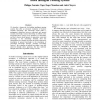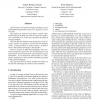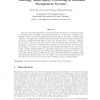112
click to vote
EMNLP
2009
14 years 11 months ago
2009
This paper proposes a novel method to refine the grammars in parsing by utilizing semantic knowledge from HowNet. Based on the hierarchical state-split approach, which can refine ...
110
click to vote
ACL
2009
14 years 12 months ago
2009
This paper proposes a novel framework called bilingual co-training for a largescale, accurate acquisition method for monolingual semantic knowledge. In this framework, we combine ...
130
click to vote
ACL
2010
15 years 1 days ago
2010
Name ambiguity problem has raised urgent demands for efficient, high-quality named entity disambiguation methods. In recent years, the increasing availability of large-scale, rich...
114
click to vote
FLAIRS
2008
15 years 3 months ago
2008
We describe a framework for building intelligent tutoring systems that offer an advanced evaluation of learners' semantic knowledge. The knowledge model makes a pedagogical d...
131
click to vote
AAAI
2006
15 years 3 months ago
2006
Relationships between concepts account for a large proportion of semantic knowledge. We present a nonparametric Bayesian model that discovers systems of related concepts. Given da...
125
click to vote
LWA
2008
15 years 3 months ago
2008
A couple of semantic wikis have been proposed to serve as collaborative knowledge engineering environments
105
click to vote
ASSETS
2005
ACM
15 years 4 months ago
2005
ACM
We propose an integrated approach to interactive word-completion for users with linguistic disabilities in which semantic knowledge combines with n-gram probabilities to predict s...
105
click to vote
PDP
2003
IEEE
15 years 7 months ago
2003
IEEE
File I/O data is interpreted by high performance parallel/distributed applications mostly as a sequence of arbitrary bits. This leads to the situation where data is ’volatile’...
134
click to vote
COOPIS
2003
IEEE
15 years 7 months ago
2003
IEEE
The use of semantic knowledge in its various forms has become an important aspect in managing data in database and information systems. In the form of integrity constraints, it ha...
120
click to vote
IJCNLP
2005
Springer
15 years 7 months ago
2005
Springer
Abstract. We build a class-based selection preference sub-model to incorporate external semantic knowledge from two Chinese electronic semantic dictionaries. This sub-model is comb...



